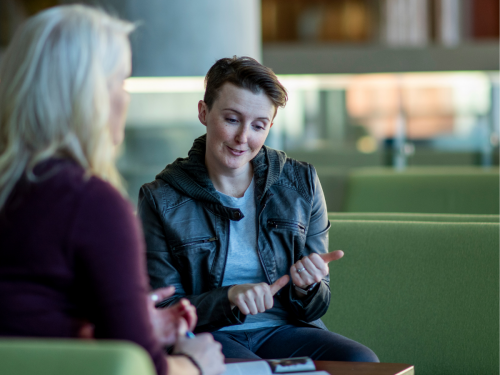Going to university can be an extremely positive experience for deaf students. But with the Covid-19 pandemic, this year has been a particularly tough time for students in higher education, and is taking its toll on mental health.
Whether you’re just starting university or are mid-way through your studies, here are 5 ways to protect your mental health, particularly for deaf students. We’ve also included some tips from third-year deaf student Eleanor Hassall.
-
Give yourself time to settle in
When you first start university, it can be a shock to the system. After months at home, the sudden discipline of lectures, studying and interacting with lots of people, whether in lectures or online, can be overwhelming.
Make sure you give yourself time to settle in and adjust, and take breaks when you need too.
Eleanor advises to: “be prepared for the hearing shock and concentration fatigue that comes with having to lip read and trying to comprehend so many different accents from all around the world so suddenly.”
-
Take time for yourself when you need it
Whether you’re living away from home or not, university can be demanding. Trying to balance work, finances and your social life can be tough, especially whilst navigating life in unfamiliar circumstances like a global pandemic.
Find ways to help yourself relax during difficult times by doing things you enjoy. Take time out to give your mind a rest, which will leave you feeling revived, positive and happier.
Perhaps you like to read or do a creative activity. Maybe you enjoy treating yourself to a beauty or self-care routine, exercise or meditation.
The Mental Health Foundation suggest “try to do something nice for yourself every day and celebrate small wins”. Read more of their mental health advice here.
Eleanor suggests “make sure you’re giving yourself time to switch off and relax however that works best for you – be it exercise, Netflix, a cup of tea or something else! Exhaustion has a huge impact on mental health, so keep an eye on this!”
-
Get accessibility support
When you start university, it’s important to register with the disabled services team as soon as possible, and find out what support is available to you.
Social distancing regulations vary at each university so make sure you find out how Covid-19 will impact access to support on your course, such as palantypists or BSL interpreters.
If some or all of your course is being taught online, make sure to ask how accessible it will be, and let your university know if you will need extra support.
Eleanor experienced huge challenges as her university was forced to adapt to online teaching when the pandemic hit. Luckily, she’s successfully arranged assistance with a specialist note taker this year.
Her advice on accessibility support? “You’re expected to be a lot more proactive and self-advocate for your own accessibility support more, which can be very hard to adjust to.”
-
Make connections
Many universities have societies for deaf students, such as sign language clubs, or clubs based around other interests and hobbies, that are accessible to deaf students.
Find out what societies and clubs your university has to offer, these are usually listed online or can be found through student’s unions. Although it may seem daunting at first, being able to connect with similar people may make you feel more supported.
Eleanor agrees: “the peer support and being around people who ‘get it’ can be so amazing and make such a huge difference”.
She also adds: “A lot of uni freshers weeks’ revolve around going out and ‘dinner-table syndrome’ of feeling like your deafness is very lonely and isolating. Try to mitigate that by arranging to meet people for coffees or in a less loud place or, if you feel comfortable doing so, explain your deafness and how they can help with communication.”
-
Ask for help
Don’t be afraid to ask for mental health support if you need it. It’s okay to admit you’re struggling, no matter how severe or mild you think your problems may be. There are many support services out there who can help.
Shout run a 24hr crisis text line providing immediate help if you are suffering from mental health issues. Text 85258 for free, confidential support from trained volunteers who can help you reach a moment of calm.
Clic is an online community who support people with their mental health. Mind offer a similar online support service on their Elefriends community. These are both safe, moderated spaces where you can chat to others online, find mutual support and share resources.
The NDCS run an advice line, web chat and BSL video call service, offering practical help for deaf people aged under 25.
Eleanor said “remember that ultimately you’re all in the same boat – moving away from home for the first time – so talking to people around you, like those on your course or in your halls is the best thing, as chances are they’re all feeling the same. Peer support really is the best.”
Three Key Takeaways
- Going to university as a deaf student is challenging, and this year will present many new challenges. Make sure to find out what support is available and how it could be impacted.
- Although it can be overwhelming, there are other deaf students out there in the same boat. Try to connect with others digitally, or in person to share ideas and experiences.
- Remember there is support out there and ask for help if you need it. Find some ways to help yourself relax and de-stress and take time out when you need to.
Special thanks to Eleanor for sharing her experiences and advice for other deaf students.
This article was written by Christina, who has worked in travel and content for years. She and her family recently left London for a new life by the sea. She’s an energetic storyteller, writer and blogger and has just completed her first upholstery project.
Looking for more support? We’ve made it our mission to improve the lives of deaf people everywhere. Check out Deaf Unity’s projects to find out what we can do for you. If you’d like to get in touch, contact us here.






